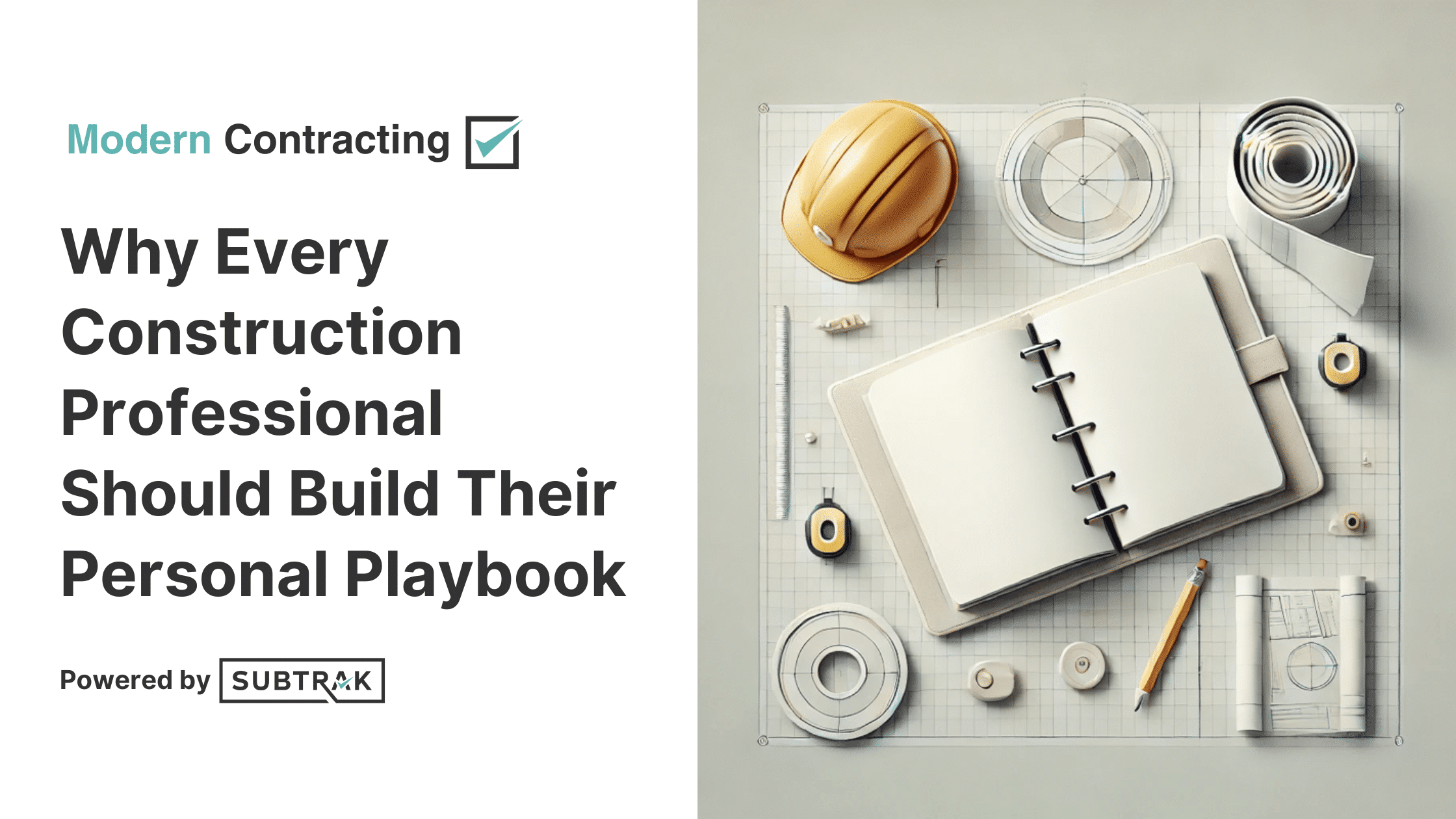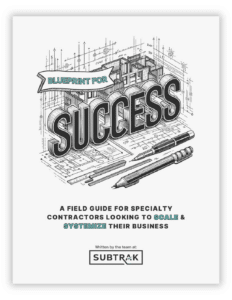Construction is an industry built on experience. You learn by doing, by failing, by listening to those who’ve been there before, and by figuring things out as you go. It’s a field that rewards practical knowledge, adaptability, and a strong work ethic. But here’s the thing: relying solely on experience and memory can only take you so far.
As construction becomes increasingly complex—with more regulations, safety standards, and evolving technologies—what worked a decade ago isn’t enough anymore. The days when you could keep everything in your head or operate without a defined system are behind us. That’s why creating a personal playbook—a documented way of doing things—isn’t just a good idea. It’s a career investment.
What Is a Personal Playbook?
Think of a personal playbook as a guide to your way of working. It’s not a corporate manual or a company-wide SOP. It’s yours. It’s where you document your processes, refine them over time, and develop a framework that reflects your unique expertise. Whether you’re a project manager, a superintendent, or a salesperson, your playbook is a living resource that helps you:
- Stay consistent in how you approach tasks
- Avoid mistakes by capturing lessons learned
- Operate at a higher level by refining your methods over time
Why the Construction Industry Needs Personal Playbooks
Historically, construction has been a “just get it done” industry. You show up, you learn on the job, and you build your expertise over years of trial and error. This approach worked when projects were simpler, and there were fewer rules to follow. But today’s construction landscape is different.
Regulations are stricter. The stakes are higher. And the sheer volume of information you’re expected to manage is overwhelming. Relying on memory alone isn’t just risky—it’s inefficient. Here’s why playbooks are becoming essential:
- Complexity Has Outpaced Memory
A modern construction project involves dozens of moving parts, from compliance to scheduling to client communication. One person can’t possibly keep track of everything in their head without something slipping through the cracks. - Mistakes Are Costly
Missing a deadline or forgetting a step in your process can derail an entire project. A playbook helps you stay organized, accountable, and on top of your responsibilities. - Construction Is a Team Sport
You’re not working in isolation. Whether you’re handing off tasks to a superintendent or collaborating with a sales team, having a documented way of working ensures clarity and alignment.
Your Playbook Is a Career Investment
Here’s where it gets personal. Your playbook isn’t just a tool for your current job—it’s a resource you can carry forward throughout your career. Here’s why it’s worth investing your time into:
- Stand Out in Your Field
When you’re looking for a new job or pitching your services to a client, your playbook becomes proof of your expertise. Imagine walking into an interview or meeting and saying, “Here’s how I manage projects” or “This is my process for ensuring every job meets quality standards.” It’s more than a portfolio; it’s a testament to how you think, work, and solve problems. - Learn Through Reflection
Writing things down forces you to clarify your thoughts. It helps you understand what works, what doesn’t, and where you can improve. And every time you revisit your playbook, you reinforce those lessons, making you sharper and more effective. - Reduce Stress and Stay Focused
Construction can be overwhelming, even for the most experienced professionals. Having a clear system to fall back on reduces decision fatigue and gives you peace of mind. You know you’re not forgetting anything because it’s all laid out in your playbook. - Adapt to the Next Level
As you grow in your career, new responsibilities will demand new skills. Your playbook evolves with you, helping you level up and stay organized even as the stakes get higher.
How to Start Building Your Playbook
The idea of documenting everything you do can feel daunting. But you don’t have to tackle it all at once. Start small:
- Identify a Recurring Task: What’s something you do often—job site inspections, client updates, scheduling? Write down the steps you take to complete it.
- Keep It Simple: Don’t worry about making it perfect. Focus on clarity and capturing what works for you.
- Add Lessons Learned: The next time you handle that task, update your playbook with any insights or improvements.
- Organize It: Use whatever format works for you, whether it’s an electronic document, a physical notebook, or a platform like Subtrak (more on that in a minute).
Over time, your playbook will grow into a comprehensive guide to how you work best.
Why Playbooks Aren’t Just for Management
There’s a misconception that systemizing processes is only for the higher-ups—the business owners or department heads. But the truth is, anyone can benefit from having a documented system. Whether you’re a new project manager or a seasoned superintendent, a playbook helps you:
- Stay Accountable: It’s easier to do the things you should be doing when you’ve written them down.
- Teach Others: Sharing your playbook with a teammate or mentee accelerates their learning and strengthens your team.
- Set Standards for Yourself: It’s not just about getting the job done—it’s about doing it well, every time.
A Final Word on Tools
Your playbook doesn’t have to be fancy. It just has to work for you. That said, tools like Subtrak can make the process easier by giving you a digital space to document, organize, and refine your systems. With Subtrak, you can create workflows, track your progress, and even use AI to help you draft your processes.
If you’re ready to take your career to the next level, start by documenting how you work. Your future self will thank you.
Closing Thoughts
At the end of the day, a personal playbook isn’t just about doing your job—it’s about showing up as the best version of yourself. It’s about building something lasting, something you can be proud of. Whether you’re tackling today’s challenges or preparing for the next big opportunity, your playbook is the foundation that sets you apart.
Take the time to create yours. You won’t regret it.





